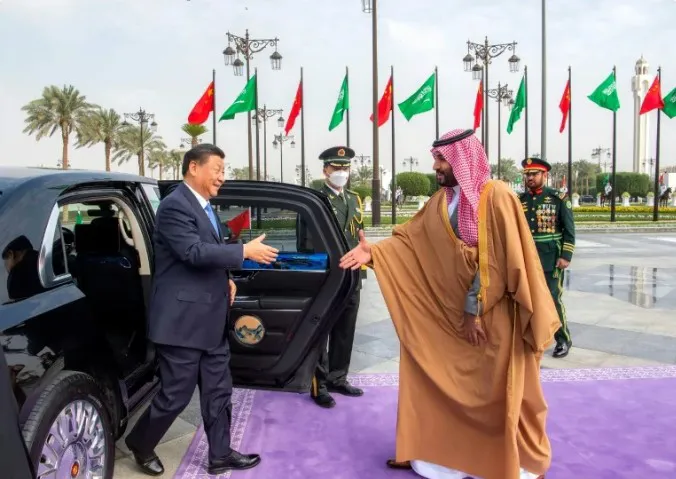Forging new era of new partnerships
Xi Jinping’s visit to the oil-rich Gulf Arab nations seems to be a new weapon to compete with the US to win this competition.
Being outside of all events that happened during the visit of China's president Xi Jinping to the Gulf, the US must have been worried about and concerned about China's push to conquer the Arab world and the US's Arab allies’ desires and readiness to move closer to China. A new era of relationships and new kinds of partnership, like the Chinese president mentioned before traveling to the Gulf, seemed to be China's new weapons to compete with the US in the Gulf and the Arab world and to win this competition.
| China's President Xi Jinping and Crown Prince of Saudi Arabia Mohammed Ben Salman in Riyad, Saudi Arabia, on December 8. Photo: Saudi Press Agency |
The three events were Xi's visit to Saudi Arabia and his attendance at a summit of the Gulf Cooperation Council and a summit of the Arab League. Of course, Saudi Arabia is China's most important partner in the Gulf and the Arab world, the pivot and focal point in China's strategy for this region. Among outside powers and partners, the US's influences have been dominating this region. There are in the Arab world many countries being traditional allies of the US. But in recent times, the US increasingly shifted away from this region, creating growing doubt among its traditional allies and regional partners about its credibility, commitments, and engagements. To reduce their independence from the US in the security field, increase their prices in the US's global strategy, and safeguard their future, the Arab countries seek to diversify their international relations and look for new partners and partnerships. In this context, they consider China their most proper alternative, and that is just China's unique chance.
Therefore, it surprised nobody when China applied a new approach. It presents itself as a reliable trade partner and investor whose cooperation concepts and practices were always directed by the win-win philosophy. It is deeply rooted in China's strategic and long-term calculations that its strategies toward the US's traditional allies and partners not only in this region but also everywhere in the world could only succeed if China enough and properly cares about all concerns and dismays US traditional allies and partners on and at the US's policies toward and art of dealing with them. That was Xi's key to success during his visit. That was why he easily reached many significant agreements on cooperation with countries in this region which the US is surely eager to have, such as oil and gas export, infrastructure projects, security, and defense, using China's currency instead of the US dollars......
With his visit, China's president opened China's market and gates to the Asia-Pacific for its Arab partners and got new access to the Gulf and the Arab world for China. A new geostrategic constellation is now shaping itself in the Gulf, Middle East, and Northern Africa.
Disclaimer: The views expressed by Ambassador Tran Duc Mau are his own and do not necessarily reflect the opinions of The Hanoi Times.









